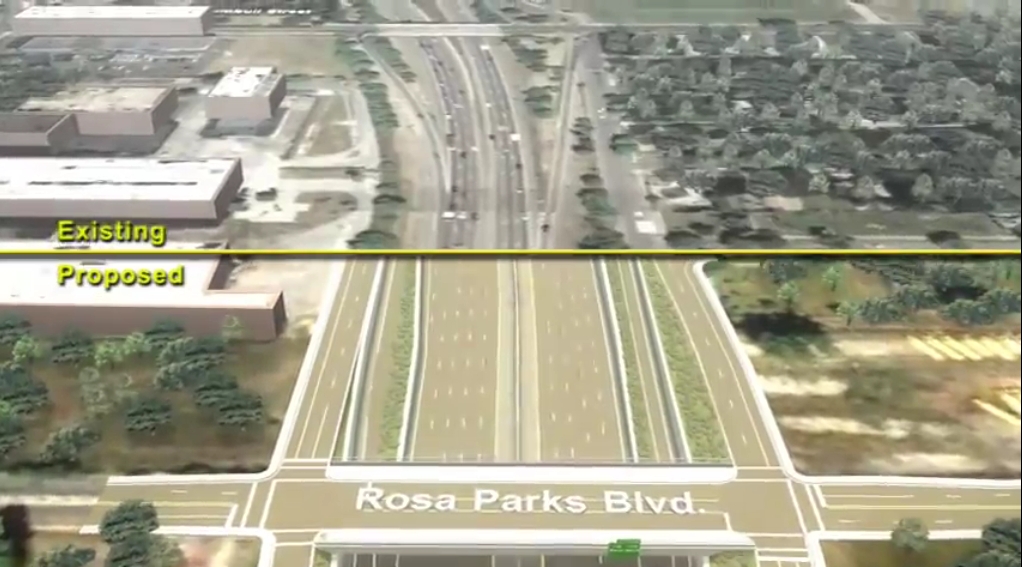 A new national report identifies state plans to widen Interstate 94 through Detroit as one of 11 examples of wasteful highway spending based on its outdated assumptions. The study finds that the $2.7 billion project is based upon old forecasts of traffic trends that have proven badly in error and calls for the state to reconsider the widening and reprioritize scarce transportation dollars elsewhere.
A new national report identifies state plans to widen Interstate 94 through Detroit as one of 11 examples of wasteful highway spending based on its outdated assumptions. The study finds that the $2.7 billion project is based upon old forecasts of traffic trends that have proven badly in error and calls for the state to reconsider the widening and reprioritize scarce transportation dollars elsewhere.
TRU helped release the report to local media, believing that in a region whose population has not grown in over thirty years, it is inappropriate and wasteful to spend billions of dollars to add additional lanes to our roadways. While I-94 certainly needs to be repaired, tearing out pedestrian bridges and widening this throughway is wrong for our community.
Just 3% of the cost of the I-94 widening would be enough to build and operate the long-proposed commuter train between Detroit, Metro Airport, and Ann Arbor, providing a real alternative to I-94.
The report, Highway Boondoggles: Wasteful Spending and America’s Future, was written by the US Public Interest Research Group and identifies 11 highway expansion projects that need reconsidered.
It describes how MDOT’s proposal to widen I-94 is based on 2003 forecasts that vehicle miles traveled in the region would increase 11 percent by 2025. Instead, the miles driven had already fallen 14 percent by 2013. The report similarly outlines how traffic counts on roadway show traffic consistently declining.
“Americans have been driving less, but Michigan and the federal government are still spending billions of dollars on highway expansion projects that are based on outdated and obsolete assumptions,” said Phineas Baxandall, a co-author of the report. “The time has come to shift transportation resources toward repairing our existing roads and investing a wider range of transportation choices.”
The report does not contest that major roadwork is needed to restore pavement quality on I-94, just that there is no justification for adding additional highway lanes and new multi-lane service drives in each direction.
With limited resources dedicated to repair, Michigan has 11,022 bridges that engineers have deemed “structurally deficient,” according to the most recent (2013) National Bridge Inventory tabulated by the Federal Highway Administration (See “All Bridges” linked here).
“That’s 11 thousand reasons not to waste Michigan tax dollars on widening I-94 through Detroit,” said Baxandall.
“The plan to widen I-94 is likely to increase traffic volumes, congestion, and air pollution over the long term in a city where adult asthma rates are more than twice as high as the state average, and which contains 5 of the top 25 most polluted ZIP codes in Michigan. The state’s fifth-most polluted ZIP code, 48211, is located at the center of the I-94 project corridor,” said Nick Schroeck, Executive Director of the Great Lakes Environmental Law Center.
In addition, the I-94 widening project would require demolishing or displacing a couple dozen homes and businesses, such as the city’s oldest recording studio, and would eliminate 11 pedestrian bridges that currently connect the midtown and New Center neighborhoods. Numerous local organizations, businesses, institutions, and individuals have spoken out in opposition to the widening project and urged MDOT to drastically scale back the project to acknowledge transportation trends and better support the local community.
The report can be found at the following link: http://uspirg.org/issues/usp/21st-century-transportation